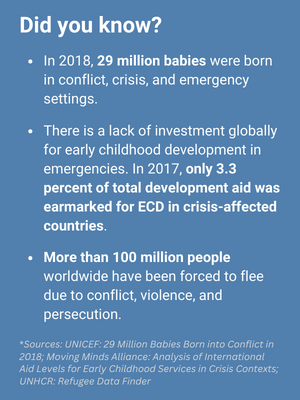CE International Working With INEE to Develop a Programming Guidance Tool for Early Childhood Development in Emergencies (ECDiE)



An estimated 87 million children ages 7 and under have spent their whole lives in conflict, crisis, and emergency settings, and the numbers are growing.
Young children are some of the most vulnerable people worldwide, and even more so in moments of violence and disaster. Yet, children and families in emergency settings often lack the early childhood services that could help, and practitioners and educators in crisis settings may not have extensive training on how to support young children who have experienced trauma and displacement.
Childhood Education International is working in conjunction with the Inter-agency Network for Education in Emergencies (INEE) to help change that.
CE International and INEE’s Early Childhood Development Working Group – an international community of practice dedicated to developing and disseminating practical tools and publications for use in early childhood develop in emergencies – are working to develop an ECDiE (Early Childhood Development in Emergencies) Programming Guidance Tool.
The Programming Guidance Tool is intended to serve as a “toolbox” for practitioners and local-level implementers serving young children and families who face emergencies and crises in their communities worldwide. As a compilation of resources, information, and supporting materials, the Programming Guidance Tool will offer practical guidance to those working on the ground before, during, and after an emergency or crisis, and for those striving to plan, design, and implement integrated ECDiE services and interventions.
The Programming Guidance Tool is expected to be available on a web-based platform, making it more accessible and user-friendly.

Explore CE International's consulting services.